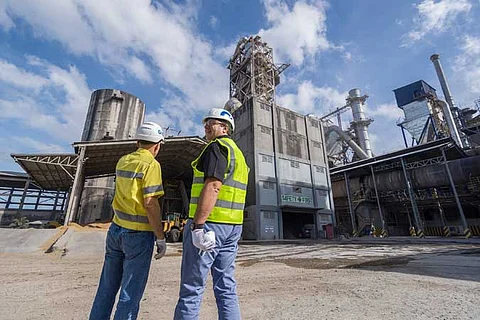
- NEWS
- the EDIT
- COMMENTARY
- BUSINESS
- LIFE
- SHOW
- ACTION
- GLOBAL GOALS
- SNAPS
- DYARYO TIRADA
- MORE

Local cement manufacturers stressed on Thursday that the domestic industry is not struggling due to lack of demand but rather because of the overwhelming influx of imported cement.
During the fourth day of a hearing at the Tariff Commission on the proposed definitive safeguard duty on imported Ordinary Portland Cement (AHTN 2022 Subheading No. 2523.29.90) and Blended Cement (AHTN 2022 Subheading No. 2523.90.00), representatives from the Cement Manufacturers Association of the Philippines (CeMAP) revealed that local plants are operating at just 53% of their total 51-million metric ton capacity.
“This means nearly half of the local capacity is not being used,” CeMAP members said during the hearing.
At the witness stand, importers’ representatives faced pointed questions. William Sumalinog, Chief Operating Officer of Philcement, claimed there was insufficient cement supply in the Philippines. However, when confronted with a news report showing that CEMEX solely supplied the longest bridge in the country, he admitted he was unaware of it.
CeMAP highlighted further evidence of underuse, citing that one of Republic Cement’s pyroprocessing units had to shut down due to reduced operations — not because of falling demand, but due to increased pressure from imports.
Sumalinog’s past statements also drew scrutiny. While he now claims supply shortages, a 10 September 2020 press release from Holcim Philippines—where he formerly worked—quoted him asserting that the company was “well equipped to deliver great value and support” for Mindanao's growing construction demand.
“This public statement directly contradicts his current claim of insufficient supply,” CeMAP said, calling into question the consistency of importers' arguments.
Another importer representative, Kendrick Tan of Fortem, alleged that new players are more efficient than legacy cement firms. But when pressed during questioning, he failed to present data or personal knowledge to back his claims, later admitting they were based on publicly available information and described as “opinions.”
CeMAP President John Reinier Dizon closed the hearing by thanking DTI Secretary Ma. Cristina Roque for initiating the motu proprio investigation. He emphasized that the industry’s stance was not anti-import, but about establishing a level playing field.
“We have nothing against importers,” Dizon said. “But we have invested billions in building up local capacity, and the level of underutilization we are seeing now is just overwhelming.”
He reaffirmed the industry’s role in national development but stressed it can only fulfill that role if given a fair chance to compete.
Earlier, Secretary Roque had said the DTI fully supports the local cement sector, as protecting the industry also safeguards the livelihoods of small and medium enterprises involved in the supply chain.
